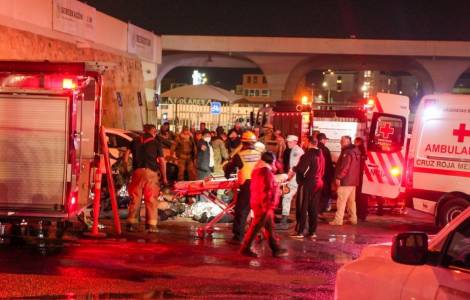
LaJornada
Guatemala City (Agenzia Fides) - "As we have said more than once, 'Guatemala has the primary obligation to fulfill and enforce the rights of male and female citizens to remain in their country in dignified conditions and in accordance with their rights', failing to comply with this responsibility, Guatemala and especially the officials on duty are co-responsible for the events that occurred in the fire at the immigration station in Mexico". This is what the Pastoral Care of Human Mobility of the Episcopal Conference of Guatemala writes, in a "public pronouncement of solidarity and indignation" about the tragic fire in Ciudad Juárez that has cost the lives of 39 migrants (see Fides, 30/3/2023).
Of the 39 victims, according to the authorities, 18 were from Guatemala, 7 from El Salvador, 7 from Venezuela, 6 from Honduras and 1 from Colombia. They were all men, between 18 to 51 years of age. The 28 injured were 10 from Guatemala, 8 from Honduras, 5 from El Salvador and 5 from Venezuela.
The Pastoral Care of Human Mobility expresses its condolences and solidarity "to the families of all the victims of the tragic fire, in particular to the families of Guatemalans who died in the deplorable and condemnable act". Invoking the comfort of God the Father for the families of the victims, he hopes for divine help to "transform indignation and impotence into concrete and permanent actions of solidarity" which respond to the request for a dignified life for those who are forced to seek better living conditions, faced with the abandonment and inaction of the states involved, of origin, transit and destination.
The text, sent to Fides, underlines that these temporary reception centers for migrants "end up being detention centers, where the human rights of people in forced mobility are violated". Therefore, it is reiterated: " "Enough of euphemisms, we must not accept or tolerate that soft or decorous words or expressions are given to what truly constitutes a detention center, which does not meet dignified or safe conditions".
For this reason, The Pastoral Care of Human Mobility requests that the accompaniment, support and concrete concern of the consulate towards the families of the deceased and injured victims, such as a dignified, fast and free repatriation of the bodies of their loved ones. “In communion with the whole Church and in line with the Gospel – concludes the pronouncement -, we renew our pastoral commitment to accompany people in forced mobility. In the same way, we cry out to God to enlighten the governments involved, so that they assume as countries of origin, transit, destination and deportation, their responsibility to create and implement public and immigration policies that respond to the structural-real causes that force thousands of of people to migrate.
The issue of emigration and the laws applied by the States towards emigrants has been widely treated and discussed, especially by the Central American Churches. The participants in the VIII meeting of bishops and pastoral agents of the southern border of Mexico and Central American countries, held in August 2022 in Antigua, Guatemala, (see Fides 9/1/2022) had asked "the social and political leaders of our countries to act decisively, implementing local and regional actions and policies that promote inclusive and harmonious development, respecting the laws and agreements in force”.
Local churches in Central American countries "are called to reinforce the pastoral care of human mobility, especially where the presence of our migrant brothers and sisters is greater, to strengthen the spaces for national and regional articulation and to share experiences of service to migrants, refugees, displaced victims of trafficking, to improve our work, permanently monitoring the situation”. The final text states that the governments of the region "continue to apply development models that deepen socio-economic inequalities and accentuate the precarious condition in which the majority of the already impoverished population lives". (SL) (Agenzia Fides, 31/3/2023)